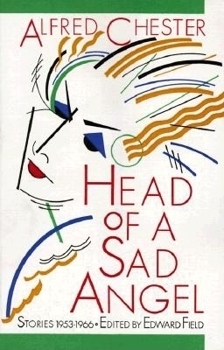Head of a Sad Angel: Stories 1953-1966
Select Format
Select Condition 
Book Overview
A collection of stories by Alfred Chester. This description may be from another edition of this product.
Format:Paperback
Language:English
ISBN:0876858035
ISBN13:9780876858035
Release Date:December 1990
Publisher:Black Sparrow Press
Length:377 Pages
Weight:1.30 lbs.
Dimensions:1.1" x 5.9" x 9.0"
Related Subjects
Contemporary Fiction Literature & Fiction Short Stories Short Stories & AnthologiesCustomer Reviews
2 ratings
Excellent intro to a sadly neglected author
Published by Thriftbooks.com User , 23 years ago
Alfred Chester, Head of a Sad Angel: Stories 1953-1966, edited by Edward Field (Black Sparrow, 1990)Alfred Chester is something along the lines of the godfather of what we now know as eighties literature. Warmer than Bukowski, more detached than Faulkner, closer to the point than Sherwood Anderson ever got, the novels pumped out thirty years later by such authors as Ellis and McInerney could have been tarred by the same brush, though Chester mixed a kind of hard-boiled romance with his stark realism. And yet, as Edward Field reminds us in his introduction to the book's nonfiction appendix, Chester was almost totally forgotten by the time of his death in 1971, at the age of forty-three. The fact that an obscure, unknown, then-out-of-print writer could have still influenced a whole (albeit a bad) genre should tell us something: specifically, that Chester is possibly the most neglected important American writer of the twentieth century.It seems to me that Chester became a forgotten writer as the stars of contemporaries such as Bukowski and Ferlinghetti were rising because Chester went the opposite way of such writers. What Buk et al. distilled from Faulkner was the no-nonsense prose, the ability to tell a tale in the elevated prose that marks poetry while keeping the work as readable as possible. This made Buk et al.'s work more accessible to the public, and thus it was ripe for mainstream consumption. Chester, on the other hand, wrote prose that's as close to poetry as one is ever likely to find; rather than work on the accessibility factor, Chester shuned the idea and mined the simple power of words, leaving them elevated, but unpolished. As such, Chester's stories often demand to be read at leisure, in small doses, and more often than not the writing is thick, many-layered, difficult; yet the reward is there. Chester was a profoundly good writer, and every story in this collection is a gem.The second section of the book, comprising about seventy pages, is a series of reflections on Chester by those close to him during his descent into the madness that ultimately, though indirectly, caused his death. Such authors as Cynthia Ozick, Dennis Selby, Ira Cohen, and Robert Friend recount anything from one-page snatches of image to long essays on Chester's life. There's a lot of good material here (and it reinforces the autobiographical nature of Chester's work), but it seems to me that Chster's material could have stood on its own, and the biographical materil would have made for a good anthology-style biography of Chester.The previously-mentioned descent is all too obvious in Chester's work. Early material is tight, ominous, less obtuse than the later work, and with more attentino paid to craft. "As I Was Going Up the Stair" is a horror story in the grand old tradition, but with a sense of newness about it that still rings fresh today; like the best of today's authors, Chester gives us not ghosts and ghouls, but the horrors of absence, of separation. Th
My unsung hero
Published by Thriftbooks.com User , 25 years ago
This is a brillent collection of short stories written by one of the most talented authors and literary critics of the 20th century.






